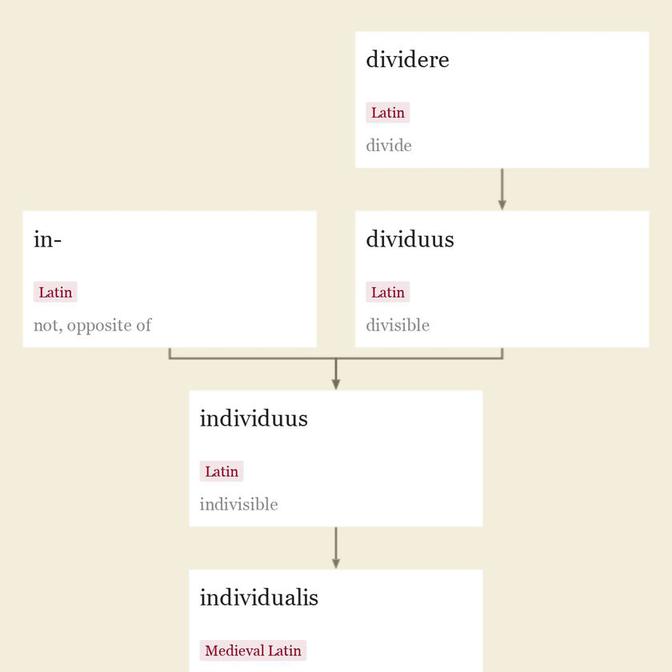individualist (n.)
1839年,"自我主义者,自由思想家",源自 individual 和 -ist,并可参考 individualism。相关词汇: Individualistic。
最早记录年份: 1839
individualist 的相关词汇
individual (adj.)

15世纪初,“一体不可分割的”(指三位一体)来自中世纪拉丁语 individualis,来自拉丁语 individuus “不可分割的”,来自 in- “不,相反的”(参见 in-(1))+ dividuus “可分割的”,来自 dividere “分割”(参见 divide(v.))。原始意义现已过时; 这个词在1600年前并不常见,15世纪的例子可能是个例外。指“单一的,独立的,只有一个人或物”的意思来自17世纪; 指“为一个人而设计的”的意思来自1889年。
Individual views a person as standing alone, or persons as standing separately before the mind: as, the rights of the individual; the rights of individuals: it is incorrect to use individual for person unemphatically ; as, there were several individuals in the room. [Century Dictionary]
Individual 将一个人视为独立的,或将人们在思想中分开:例如, individual 的权利; individuals 的权利:使用 individual 来代替 person 是不正确的; 例如,房间里有几个 individuals。[世纪词典]
individualism (n.)
"独特或个体的品质,个性",1815年,来自 individual + -ism。作为一种社会哲学的名称,支持政府不干涉个人生活(与 communism 和 socialism 相对),首次出现在 J.S. Mill 的著作中,于1851年。
Is it not the chief disgrace in the world, not to be an unit; not to be reckoned one character; not to yield that peculiar fruit which each man was created to bear, but to be reckoned in the gross, in the hundred, or the thousand, of the party, the section, to which we belong; and our opinion predicted geographically, as the north or the south? [Emerson, "The American Scholar," 1837]
难道不是世界上最大的耻辱,不是一个单位; 不被认为是一个角色; 不产生每个人被创造出来承载的独特果实,而被认为是我们所属的党派、部门的总体,百分之一或千分之一; 我们的意见被地理地预测,如北方或南方?[爱默生,《美国学者》,1837年]
-ist
这个词缀表示“做某事的人”,也用于表示遵循某种信条或习俗,源自法语 -iste,直接源自拉丁语 -ista(西班牙语、葡萄牙语、意大利语 -ista 也源自此),源自希腊语代词后缀 -istes,该后缀来自于动词词干 -izein 的词尾 -is-,加上代理后缀 -tes。
变体 -ister(如 chorister, barrister)源自古法语 -istre,是基于 ministre 的错误类比。变体 -ista 源自西班牙语,在20世纪70年代被拉美革命运动的名称在美国英语中广泛使用。